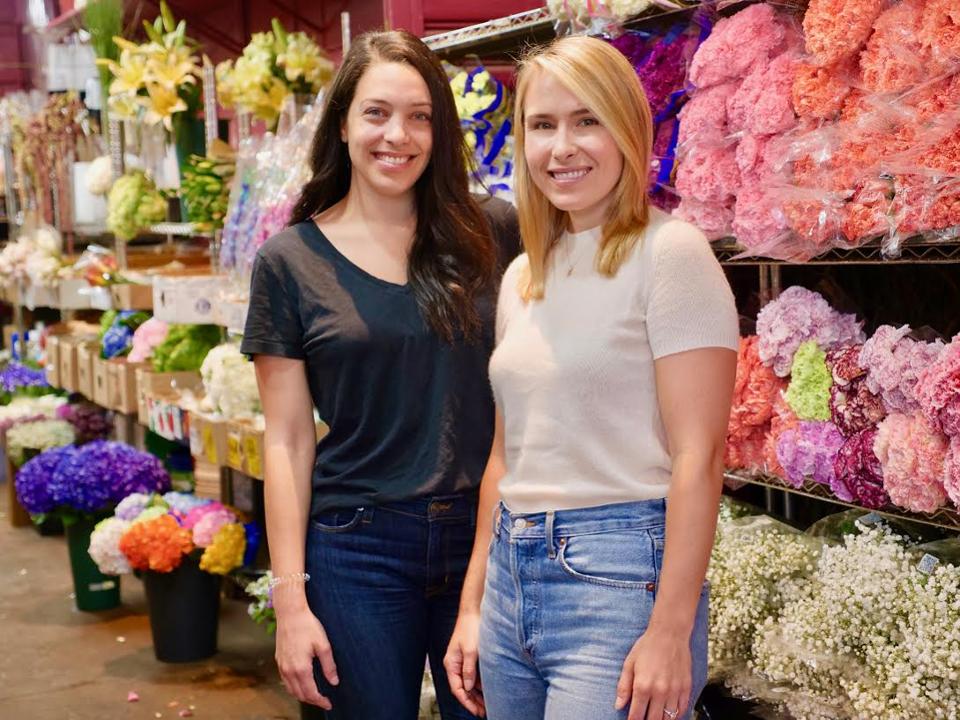Danit Zamir founded Bloomerent, a marketplace for sharing event flowers, as a solo founder and CEO in 2014. But the company really bloomed when she brought on Julia Capalino as a cofounder and co-CEO in 2016. “I decided that I wanted a cofounder to join — someone who has an entirely different skill set than I do that would complement mine and help with the workload and taking Bloomerent to the next level,” says Zamir. “We both have separate skill sets that, when combined, will take us to where we want to be. Having a co-CEO has made the biggest, and the best, difference in our progress,” adds Capalino.

What inspired you to start Bloomerent? What was your career path?
Danit Zamir: I was inspired to start Bloomerent after planning my own wedding. I recognized the high cost of wedding flowers and the waste factor after seeing my flowers thrown out five hours later.
My career path prior to founding Bloomerent was in sales, with my most notable role as an early hire at SinglePlatform, a startup that was acquired by Constant Contact. I led sales there and, as a top sales performer, I managed and trained new sales hires and eventually created a two-person team cross-selling and testing new verticals for the company.
Julia Capalino: Prior to joining [Zamir] as cofounder of Bloomerent, I was consulting startups on marketing, user acquisition, and event planning. I started my career in merchandising at J.Crew after college but left to found my first company, Pinch Parties, an event planning startup.
What has been the biggest challenge and, on the flip side, the biggest reward of starting Bloomerent?
Capalino and Zamir: One of the biggest challenges we faced was building a technical product as non-technical founders. Our first site was a landing page with a basic form for the customer to fill in, which allowed us to prove our concept. However, since we’re not coders, we couldn’t follow that up with the well-designed and functional marketplace we wanted. Some of the quotes we received from development shops and contractors were astronomical and eventually, we decided to work with a friend who was beginning her career as a developer and would give us a good rate in return for being patient on timing as she learned.
We were very conservative in our initial investment for technology and subscribed to a “create and iterate” philosophy. Our first product was functional but definitely not perfect and it didn’t give our customers the best experience. We did a lot of handholding for our customers and florists in the early days. Once we decided to hire a full-time developer, we spent a few months searching and interviewing candidates via AngelList, LinkedIn, and cold emailing. We eventually found and hired our lead developer and it was the best decision we’ve made.
As non-technical founders, it is always a challenge to know how to build your product, but it has been extremely rewarding to have to prioritize features and manually work with our customers and florists. We know the customer, problem, and solution much more holistically than we would have if everything had been automated from the start.
What advice do you have for other women who hope to start their own businesses?
Capalino and Zamir: Female entrepreneurs are known to want to wait for the “right moment” or “perfect product” before they launch. There is no such thing. The motto we live and die by is, “fail often and fail cheap.” It’s our personal belief that you should constantly be receiving feedback from your core demographic and iterating based on that feedback. If you hide your idea or concept from the people who can give you the necessary feedback you’re going to end up with a product that doesn’t meet their needs. We say cheap because we never want to invest too much in something that hasn’t been tested. Before we make a big investment in anything, product, advertising, or hiring, we want to test it out first to get a few data points.
What is a workday like? Please walk me through a day!
Capalino: Every day is different! As cofounders we each have our own focus but we also collaborate on micro and macro aspects of the business. One day [Zamir] may spend the whole day on florist sales calls and I may be deep in analytics and another day we may be at a florist’s studio with the press. We have an office at WeWork in Gramercy, so most mornings we meet there. If it is Tuesday, we will have our weekly check-in with our team of four over Google Hangouts.
What are your responsibilities as cofounders and co-CEOs of Bloomerent?
Capalino and Zamir: We split the funnel into two parts: [Zamir] focuses on florist acquisition and [Capalino] focuses on customer acquisition. [Zamir] handles sourcing, pitching, on-boarding, and managing our florist relationships and customer service, while [Capalino] handles our marketing efforts, partnerships, and press. Our backgrounds lend themselves naturally to taking on these roles and since our marketplace is a two-sided funnel with florists on one end and customers on the other, it was an easy division. We find that having a really clear division of responsibilities makes communication easier and our work more efficient.
What are the most significant benefits of having a cofounder? How do you strengthen your cofounder relationship?
Capalino and Zamir: We can’t emphasize the benefits of having a cofounder enough. The most obvious benefit is that you have someone to rely on and split the work with. As founders, we’re forced to wear many different hats; and some of those hats are professional hats that we haven’t worn before. For example, [Zamir] manages all of the legal work, and [Capalino] manages all of the accounting. While we work with lawyers and certified public accountants (CPA), we still need to be proficient so we can make the final decision. [Zamir] isn’t a lawyer and [Capalino] isn’t a CPA so it has taken a lot of education to feel confident. Being able to split those responsibilities cuts each of our workloads in half.
The less obvious benefit to having a cofounder is that there is more than one opinion that matters. When we’re making a big decision, for example, we may disagree. That means we each have to defend our viewpoint and really think through the counter-perspective. We come at problems and think of solutions in different ways, and this diversity means that when we make a final decision, it is fully thought out.
How did you decide to be co-CEOs? How do you make it work?
Zamir: When I founded Bloomerent in 2014, I spent the first year doing market research by meeting with florists and customers to really understand not just the market, but the pain points for customers and florists. I signed up two florists that year and we only did two events. The following year, I started to ramp things up and signed more florists, did more events, and launched our first website that wasn’t a landing page (but only had basic functionality). It was at that point that I decided that I wanted a cofounder to join — someone who has an entirely different skill set than I do that would complement mine and help with the workload and taking Bloomerent to the next level. That’s where [Capalino] came in. I had already known [Capalino] for a few years at this point and she started consulting Bloomerent on marketing and user acquisition. It didn’t take long for us to realize that this was the right fit: to have [Capalino] join the team in a larger role so that we can take Bloomerent to the next level together.
Capalino: It was challenging at first because [Zamir] was transitioning from being a solo founder who was doing all of the work and making all of the decisions to having someone else there to make those decisions with who had different views while learning to communicate with one another and understand each other’s personalities. We make it work because we both respect each other and share the same vision for Bloomerent. We both have separate skill sets that, when combined, will take us to where we want to be. Having a co-CEO has made the biggest, and the best, difference in our progress.
What are the most important characteristics someone needs to have to be successful in your role?
Capalino and Zamir: To be open-minded but to also be assertive. There’s no recipe that is right or wrong but, in leading a company, you need to be able to stick to your guns when you feel strongly and make a decisive decision while also being open to other people’s constructive criticism to continue to grow.
What are three characteristics you look for when you’re hiring a new team member?
Capalino and Zamir: We look for people who hustle, are open-minded, and, most importantly, are fun. Hustle, obviously, because in a startup you need to be efficient and independent. There has to be a fire in your belly and not everyone has that. Openness is important because no role is set at a startup, especially at the beginning. There is fluidity among roles and we need our team to be open to the “all hands on deck” mentality. Finally, we want to like the people we work with and we want to make work fun. It’s important for us to create a culture that is accepting of everyone but makes working long hours enjoyable. We spend a lot of time together, so it’s important to have the same work ethic and be around people with positive attitudes.
What are the most important skills for doing your job and how did you develop them?
Capalino and Zamir: One of the most important skills is pitching. We spend so much of our day pitching whether it’s to florists, customers or investors. Without this skill, our business would not succeed. We’ve developed these pitches over time and each one is finely tuned to a specific audience. There are a lot of nerves when you’re first pitching a concept, especially as a woman, and the only way to get used to the nerves is to practice. We pitch to each other, to friends, and apply to pitch competitions, all because we want to get better. The more you do it, the more the audience, narrative, and questions become familiar, and the better you are at winning whoever you’re pitching.
What’s the biggest lesson you learned at work and how did you learn it?
Capalino and Zamir: One of the biggest lessons we’ve learned is to follow our gut when it comes to hiring and firing. If you’re unhappy with an employee or contractor, it is very likely that they’re also unhappy. We learned this from experience and it taught us a lot about following our instincts and taking our time with hiring and, more importantly, recognizing that firing is essential when necessary.
What is one thing that you wish you had known when you were starting out your career?
Capalino and Zamir: Get comfortable with being uncomfortable. As a startup founder, there is a huge amount of uncertainty. Many people never get used to that state but ultimately if you want to be in the startup world, it is important to realize that ups and downs are all part of the process.
What is the best advice you’ve ever received?
Capalino and Zamir: We have no idea who said it but “Don’t compare their highlight reel to your day-to-day.” When you’re an entrepreneur, the ups and downs are very real and it is easy to look at the endpoint of another company and think you will never get there. The reality is, you have no idea how they got there or what struggles they faced on their journey, and it’s very likely that they faced a lot. It is better to focus on what you’re doing and not what anyone else is.
What is your business advice for other young professional women?
Capalino and Zamir: Ask questions. Don’t be afraid to ask for help or a favor and be specific in your ask. People want to help, but they won’t know what you need help with unless you ask. The worst-case scenario is that they say “no” but the best-case scenario is that they help and you are better off for it.
































One Response to Career Profile: Danit Zamir and Julia Capalino, Bloomerent